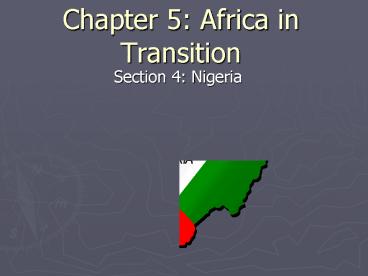Chapter 5: Africa in Transition - PowerPoint PPT Presentation
1 / 12
Title:
Chapter 5: Africa in Transition
Description:
Chapter 5: Africa in Transition Section 4: Nigeria Lesson Questions How has geography affected Nigeria s economy? How have regionalism and nationalism affected Nigeria? – PowerPoint PPT presentation
Number of Views:136
Avg rating:3.0/5.0
Title: Chapter 5: Africa in Transition
1
Chapter 5 Africa in Transition
- Section 4 Nigeria
2
Lesson Questions
- How has geography affected Nigerias economy?
- How have regionalism and nationalism affected
Nigeria? - Why did the military take power in Nigeria?
- What economic progress has Nigeria achieved?
3
Geography and People
- One of the largest and richest nations in Africa
- Also, the most populous of all nations
- 1 out of every 6 Africans is Nigerian
- Nigeria is a powerful force in West Africa
4
Geography and People cont.
- Nigeria lies north of the tropics just north of
the equator - The hot, wet climate allows for rain forests
which in turn yields a productive lumber industry - The northern part has savannas and grasslands
which yield a productive farming and herding
society
5
Geography and People cont.
- Nigeria is named after the Niger river
- The Benue River also runs through the country
which allow for irrigation - The rivers divide the country into three regions
based upon ethnicity - Northern home to Muslim Hausa and Fulani
- Southwest Yoruba
- Southeast Ibo
- Many southerners follow Christianity and
traditional beliefs
6
Geography and People cont.
- Smaller ethnic groups are scattered throughout
Nigeria - 250 ethnic groups belong to Nigeria alone
- Six major languages are spoken, predominately
English - Ethnicity attachment to ones own ethnic group
7
Political Development
- Before European imperialism the major ethnic
groups of present day Nigeria maintained their
own states - 1800s - G.B. made Nigeria into cash crop
plantations (crops were peanuts, cocoa, cotton ,
and palm oil) - After WWI and WWII Nigerian nationalism grew and
the vying ethnic groups (Yoruba, Hausa, Fulani,
Ibo) joined together under Nnamdi Azikiwes
leadership
8
Political Development
- 1960, they gained independence
- Civil war soon ensued because the Ibo thought the
Muslim Hausa and Fulani controlled too much
political power - The Ibo also claimed they had more of a right to
the local oil fields in their region - The Ibo set up the state of Biafra in 1967 which
resulted in a three year war that took 1 million
lives - To this day, regional support remains alive such
as in the Muslim controlled north they influence
the local government through Muslim law - Military dictators have controlled Nigeria for
many years until 1999 - Modern Nigerian leaders still face the problems
of uniting their people, improving the economy,
and reducing corruption
9
Economic Development
- The production and distribution of oil from
Nigeria led to wealth that equated into literacy
and new schools - However, the oil company also led to corruption
and pollution - It widened the gap between the rich and poor
- The pollution has caused attacks against oil rigs
in some areas - Despite the oil Nigeria has fallen into debt
whenever world oil prices fall - Most of its economy is government owned and
reforms are needed to combat the countries
dependence on cash crops
10
Population Growth
- A young population, a large percentage under 15
years old - 127 million people
- Urbanization is increasing and the government has
now tried to stabilize farm prices, in order to
slow movement - Nonetheless, young people in Africa prefer the
cities even with the prevalence of poverty
11
Music and Literature
- Nigeria is known for its talking drums
- The pitch can be adjusted to imitate the African
language - King Sunny Ade is known as a standout Nigerian
musician - Chinua Achebe, wrote, Things Fall Apart, which
dealt with how Europeans affect a Nigerian
village - Wole Soyinka, wrote A Dance of the Forests, was
the first African to ever win the Nobel prize for
Literature
12
King Sunny Ade
- Wole Soyinka
Chinua Achebe

